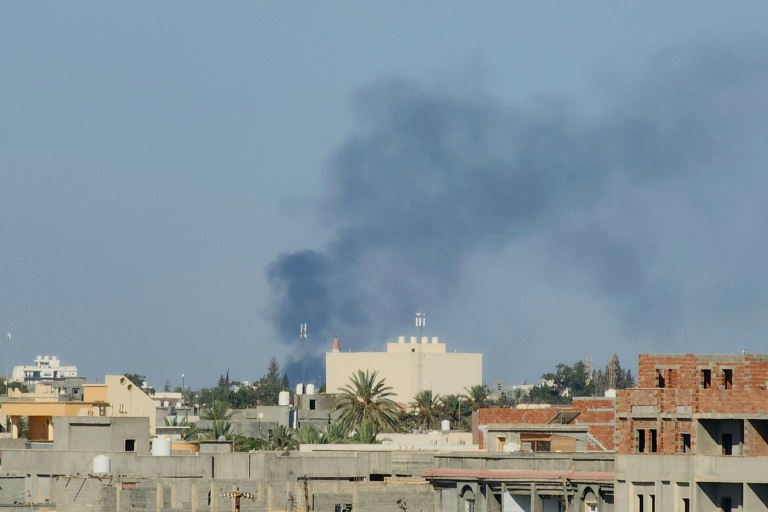Clashes between rival factions in Libya capital kill 27: medics

Smoke billows over the Libyan capital amid heavy fighting between the two main armed groups linked to the Tripoli-based government
Tripoli – Gun battles between two leading armed groups in the Libyan capital Tripoli have killed 27 people and wounded 106, a toll update from the Emergency Medicine Centre said Wednesday.
The centre, which provides emergency services in the west of Tripoli, published the “provisional” toll on its Facebook page overnight.
The clashes between the influential 444 Brigade and the Al-Radaa, or Special Deterrence Force, two of the myriad of militias that have vied for power since the overthrow of longtime dictator Moamer Kadhafi in 2011, erupted on Monday night and raged through Tuesday.
A total of 234 families were evacuated from front line areas in the capital’s southern suburbs, along with dozens of doctors and nurses who had got trapped by the fighting while caring for the wounded, the centre said.
Three field hospitals and a fleet of around 60 ambulances had been dispatched to the area when the fighting broke out.
The clashes were triggered by the detention of the head of the 444 Brigade, Colonel Mahmud Hamza, by the rival Al-Radaa Force on Monday, an interior ministry official said.
Late Tuesday, the social council in the southeastern suburb of Soug el-Joumaa, a stronghold of the Al-Radaa force, announced an agreement had been reached with Prime Minister Abdelhamid Dbeibah, head of the UN-recognised government based in the capital, for Hamza to be handed over to a “neutral party”.
In a televised announcement, the council said a ceasefire would follow the transfer of the force’s commander and late Tuesday the fighting abated.
Both armed groups are aligned with Dbeibah’s government, one of two rival administrations that vie for power through shifting alliances with the militias on the ground.
In May, the two sides had clashed for hours in Tripoli, also after the arrest of a 444 Brigade member.
Libya has seen more than a decade of stop-start conflict since the NATO-backed revolt that toppled Kadhafi.
– International appeals for calm –
A period of relative stability had led the United Nations to express hope for delayed elections to take place this year, and the latest fighting triggered international calls for calm.
The United Nations Support Mission in Libya said in a statement it was “following with concern” the security deterioration in the Libyan capital and its impact on civilians.
“All parties must preserve the security gains achieved in recent years and address differences through dialogue,” UNSMIL said.
The embassies of Britain, France, the European Union and the United States, echoed the UN call for de-escalation.
The fighting forced the closure of the Libyan capital’s only civilian airport, Mitiga, which lies in an area under Al-Radaa’s control, officials said on Tuesday.
Flights were diverted to Misrata about 180 kilometres (110 miles) to the east, and planes that had been parked on the tarmac were moved away.
The 444 Brigade is affiliated with Libya’s defence ministry and is reputed to be the North African country’s most disciplined. It controls the southern suburbs of Tripoli, and other areas.
The Al-Radaa Force, commanded by Abdel Rauf Karah, is a powerful ultra-conservative militia that acts as Tripoli’s police force.
It positions itself as independent of the interior and defence ministries, and controls central and eastern Tripoli, Mitiga air base, the civilian airport and a prison.
Libya is split between Dbeibah’s UN-backed government in the west and another in the east backed by military strongman Khalifa Haftar.
In August last year, 32 people were killed and 159 wounded in Tripoli when groups supporting the Haftar-backed government fought with Dbeibah’s forces.
Elections in Libya had been due in December 2021 but disputes including who could stand in the polls resulted in their suspension indefinitely, although the UN has been working to end sticking points.
